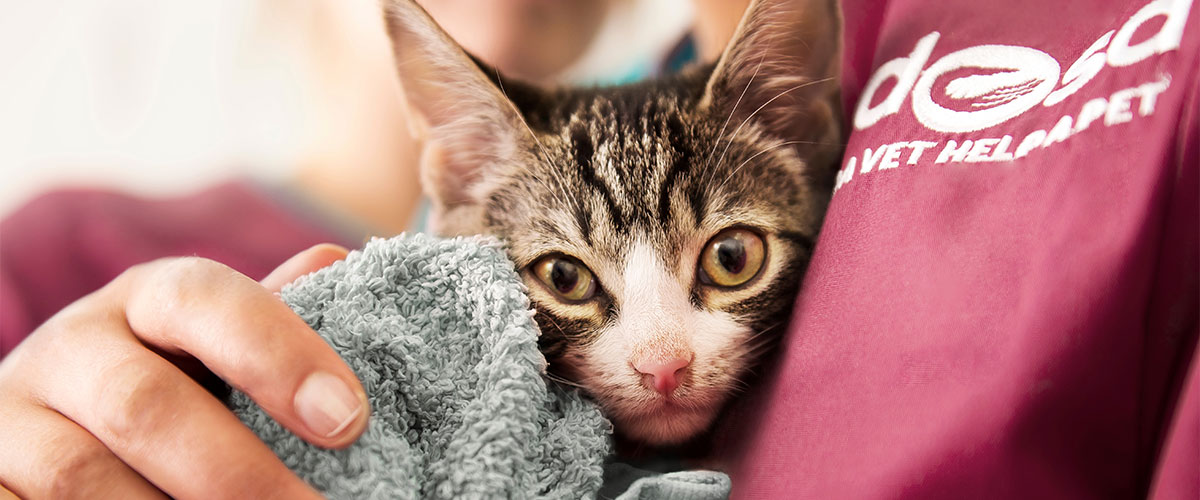Corneal ulcers in cats
Overview
- A corneal ulcer is a wound/crater that develops when something rubs or damages the surface of the eye.
- Most ulcers heal well if they are treated quickly, but left without treatment, they can be very painful, cause permanent damage and in severe cases lead to loss of an eye.
- Book an appointment with your vet ASAP if you notice a problem with your cat’s eye(s).
General information
A corneal ulcer is a wound/crater that develops when something rubs or damages the surface of the eye. Ulcers in cats are most commonly caused by catfight injuries, eye infections and cat flu. Ulcers can be difficult to see with the naked eye, which is why vets use a special green stain to diagnose and monitor them.

Symptoms
Symptoms of a corneal ulcer include:
- A red, inflamed eye
- A weepy eye
- A painful eye (closed/squinting)
- A cloudy eye
- An obvious crater or dip on the surface of the eye
Treatment
With careful nursing and the right medication, a small ulcer should heal in under a week.
- Eye drops. It’s likely that your vet will prescribe your cat with lubricating eye drops to keep the surface of their eye moist while it heals. If necessary, they will also provide antibiotic drops to treat or prevent infection. Check out our video ‘How to apply eye drops for your cat’.
- Other medication. If your cat’s eye is painful or inflamed, your vet may prescribe anti-inflammatory pain relief.
- Nursing. It’s extremely important to prevent your cat causing any further damage to their eye while it heals, which usually means a buster collar until your vet says otherwise.
- Treating the underlying cause. If your cat’s ulcer was by another underlying problem, this will also need treatment. Once the underlying cause is treated, most ulcers will start to heal.
Homecare
To care for your cat’s ulcer while it heals, you will need to:
- Give all prescribed medication. Check out our video ‘How to: give your cat a tablet’ and our medication planner.
- Make sure they keep their buster collar on and can’t rub their eye.
What if it doesn't get better?
If your cat’s ulcer isn’t healing as it should be, they may need a full examination under sedation or anaesthetic. Depending on what your vet finds, they may recommend surgery to help speed up the healing process. Your cat may need to visit a specialist eye hospital if they need a complex procedure.
Outlook
The outlook for your cat is good if their ulcer is treated quickly and nursed carefully. A simple ulcer is likely to heal within a week, but a more serious ulcer can take several weeks of treatment to heal. An ulcer left without treatment is likely to be very painful, cause permanent damage and could even lead to loss of an eye.
Cost
A simple ulcer, that heals quickly, is likely to need medication and a couple of vet checks, so won’t cost as much as a more complicated case. Treatment becomes expensive when an ulcer takes a long time to heal, and can become very expensive if specialist surgery is required.
When you welcome a new cat into your life, consider taking out Cat Insurance straight away before any signs of illness start. This will give you peace of mind that you have some financial support if they ever get sick.
There are often several treatment options so if one doesn’t work for you and your pet then the vet may be able to offer another.
Published: February 2020
Did you find this page useful?
Tell us more
Please note, our vets and nurses are unable to respond to questions via this form. If you are concerned about your pet’s health, please contact your vet directly.
Thank you for your feedback
Want to hear more about PDSA and get pet care tips from our vet experts?
Sign up to our e-newsletter
Written by vets and vet nurses. This advice is for UK pets only. Illustrations by Samantha Elmhurst.

